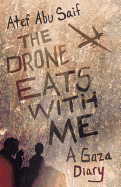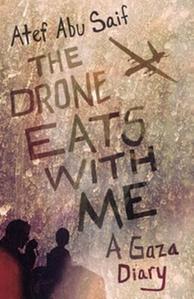
 This spare, devastating account of living through Israel's 2014 invasion of Gaza is the journal of a 40-year-old father of five, risking his life each day walking to an Internet café to write The Drone Eats with Me, as the aerial devices hum overhead, watching his every move. Atef Abu Saif fears for his wife and children, helps bombed relatives and fleeing friends, and creates a moral center of love at the heart of his science fiction-like nightmare, in which an unseen enemy watches and kills from a distance, always hovering, in the end taking the lives of 1,900 civilians.
This spare, devastating account of living through Israel's 2014 invasion of Gaza is the journal of a 40-year-old father of five, risking his life each day walking to an Internet café to write The Drone Eats with Me, as the aerial devices hum overhead, watching his every move. Atef Abu Saif fears for his wife and children, helps bombed relatives and fleeing friends, and creates a moral center of love at the heart of his science fiction-like nightmare, in which an unseen enemy watches and kills from a distance, always hovering, in the end taking the lives of 1,900 civilians.
His entries are thoughtful vignettes and mini-essays, simple, clear and straightforward; he never knows whether he will live to write tomorrow. Never sensational, with quiet dignity and a simmering rage, Abu Saif recounts what happens around his home in Jabalia, the largest refugee camp in Palestine, its streets altered by bombs as chunks of the makeshift city are reduced to rubble.
The Gazans grieve over loved ones in the wrong place at the wrong time, and watch their homes and orchards bulldozed, their animals homeless, their new airport destroyed, the achievements of their lives gone up in flames. "The only real heroism is survival," says Abu Saif, "to win the prize that is your own life."
Constantly in danger, Abu Saif describes the techniques of survival (walk down the middle of the street in plain view, hold no suspicious objects, do nothing unusual) as he makes his way amid collapsed buildings and overcrowded homes packed with relatives fleeing war zones. It's a world with waiting lines at every bathroom, frequent electric outages, spoiling food, uncharged phones and houses with missing walls. "Drones, F16s, warships, tanks: these are the instruments of the orchestra, playing the new song of our lives."
Abu Saif has written a level-headed, understated account of 51 hellish days of 21st-century warfare that reads like the true-life version of Camus' The Plague--human beings struggling to find meaning in the jaws of a random, meaningless death machine they can do nothing to stop, forced helplessly to endure devastating losses and sorrows until, for no apparent reason, the evil pauses for a few years of tentative, delicate peace. At the end, Abu Saif's 11-year-old son, already lucky enough to survive three wars, asks his father the question every reader wants to know: "Daddy, when will the next war be?" --Nick DiMartino, Nick's Picks, University Book Store, Seattle, Wash.
Shelf Talker: A 40-year-old father of five recounts the horrors of the 2014 invasion of Gaza by Israel in this heartbreaking journal of the 51-day war.

